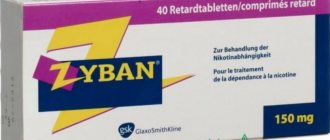Instructions for use DEPAKINE CHRONOSPHERE
During treatment with an anticonvulsant drug, resumption or development of new seizures is occasionally possible, regardless of the spontaneous changes in the course of the disease observed in some epileptic conditions. With regard to valproate, this primarily concerns the combination regimen for the treatment of epilepsy, pharmacokinetic interactions, toxicity (hepato- or encephalopathy) and overdose.
Since sodium valproate is converted into valproic acid in the body, it should not be combined with other drugs that share common metabolic pathways (for example, divalproate, valpromide) in order to prevent an overdose of valproic acid.
Before starting treatment and during the first 6 months of treatment, liver function should be periodically monitored, especially in patients at risk.
It should be emphasized that during treatment with Depakine Chronosphere, as with other antiepileptic drugs, a slight, isolated and temporary increase in transaminase levels may be observed, especially at the beginning of treatment, in the absence of any clinical symptoms. In this case, it is recommended to conduct a more complete laboratory examination (including, in particular, determination of the prothrombin index) in order to revise the dose, if necessary, and repeat the tests depending on changes in parameters.
There are extremely rare reports of severe and fatal cases of liver disease.
At increased risk are infants and children under 3 years of age with severe epilepsy, especially epilepsy associated with brain damage, mental retardation, and/or congenital metabolic or degenerative diseases. In children over 3 years of age, the frequency of such complications decreases significantly and gradually decreases with age. In most cases, liver dysfunction was observed during the first 6 months of treatment, usually between 2 and 12 weeks, and most often with combined antiepileptic treatment.
Early diagnosis is based primarily on clinical examination. In particular, two factors that may precede jaundice should be taken into account, especially in patients at risk. On the one hand, there are nonspecific general symptoms, usually appearing suddenly, such as asthenia, anorexia, extreme fatigue, drowsiness, sometimes accompanied by repeated vomiting and abdominal pain. On the other hand, there is a relapse of epileptic seizures.
It is recommended to inform the patient, and if it is a child, then his family, that if such clinical symptoms develop, you should immediately consult a doctor. In addition to clinical examination, liver function testing should be performed immediately.
Among the standard parameters, the most important are tests that reflect liver protein synthesis, and especially the prothrombin index. If an abnormally low level of prothrombin, a significant decrease in the level of fibrinogen and coagulation factors, an increase in the level of bilirubin and the activity of liver transaminases are detected, treatment with Depakine Chronosphere should be suspended. It is also necessary to interrupt treatment with salicylates if they were included in the treatment regimen, since their metabolism uses common pathways with valproate.
In extremely rare cases, severe forms of pancreatitis, sometimes fatal, have been reported. These cases were observed regardless of the patient's age or duration of treatment, although the risk was particularly increased for young children. Pancreatitis with an unfavorable outcome was usually observed in children of a younger age group, or in patients with severe epilepsy, brain damage, or when using complex anticonvulsant therapy.
Liver failure due to pancreatitis increases the risk of death.
Before starting therapy or surgery, in the case of hematomas or spontaneous bleeding, it is recommended to conduct a blood test (including determining the blood count, including platelet count, bleeding time and coagulation tests).
In patients with renal failure, it is recommended to take into account the increased concentration of free form of valproic acid in the serum and reduce the dose.
In case of acute abdominal pain and gastrointestinal symptoms such as nausea, vomiting and/or anorexia, it is necessary to keep in mind the risk of developing pancreatitis and, if the level of pancreatic enzymes is elevated, discontinue the drug, taking alternative therapeutic measures.
Sodium valproate is not recommended for use in patients with carbamide cycle enzyme deficiency. In such patients, several cases of hyperammonemia accompanied by stupor and/or coma have been described.
Although it has been shown that during treatment with Depakine Chronosphere, dysfunction of the immune system is extremely rare, the potential benefits of therapy and the risks should be assessed if it is necessary to use the drug in patients suffering from SLE.
Patients should be warned about the risk of weight gain early in treatment; To minimize this effect, the patient should follow an appropriate diet.
Use in pediatrics
In children under 3 years of age
The use of valproate (in the recommended dosage form) as monotherapy is recommended, but before starting treatment, the potential benefits of treatment with the drug should be assessed in relation to the risk of developing liver disease or pancreatitis.
Combined use with salicylates should be avoided in children under 3 years of age.
due to the risk of hepatotoxicity.
In children with unexplained gastrointestinal symptoms (anorexia, vomiting, episodes of cytolysis), a history of lethargy or coma, mental retardation, or a family history of death of a newborn or young child, metabolic studies, especially ammonemia, should be performed before initiating treatment with sodium valproate. on an empty stomach and after meals.
Impact on the ability to drive vehicles and operate machinery
During treatment, patients should be warned about the possible occurrence of temporary drowsiness and the need to be careful when driving vehicles and other activities that require high concentration and speed of psychomotor reactions (especially when using combined anticonvulsant therapy).
DEPAKINE CHRONOSPHERE extended-release granules 100 mg package No. 30
Before starting the use of Depakine® Chronosphere™ and periodically during the first 6 months of treatment, especially in patients at risk of developing liver damage, liver function tests should be performed. As with the use of most antiepileptic drugs, when using valproic acid, a slight increase in the activity of liver enzymes is possible, especially at the beginning of treatment, which occurs without clinical manifestations and is transient. In these patients, a more detailed study of biological parameters, including the prothrombin index, is necessary, and dose adjustment of the drug may be required, and, if necessary, repeated clinical and laboratory examinations. Before starting therapy or surgery, in case of spontaneous occurrence of subcutaneous hematomas or bleeding, it is recommended to conduct a hematological blood test (determine the leukocyte formula of the blood, including the number of platelets; bleeding time and coagulogram). Severe liver damage Clinical experience shows that patients at risk include those receiving multiple antiepileptic drugs at the same time, children under 3 years of age with severe seizures, especially in the presence of brain damage, mental retardation and/or congenital metabolic or degenerative diseases; patients simultaneously taking salicylates (since salicylates are metabolized through the same metabolic pathway as valproic acid). In children over 3 years of age, the risk of liver damage is significantly reduced and decreases progressively as the patient ages. In most cases, liver damage occurs within the first 6 months of treatment, most often between 2 and 12 weeks of treatment and usually when valproic acid is used as part of combination antiepileptic therapy. For early diagnosis of liver damage, clinical observation of patients is mandatory. In particular, you should pay attention to the appearance of the following symptoms that may precede the onset of jaundice, especially in patients at risk: nonspecific symptoms, especially sudden onset, such as asthenia, anorexia, lethargy, drowsiness, which are sometimes accompanied by repeated vomiting and abdominal pain; resumption of seizures in patients with epilepsy. Patients or their family members (when using the drug in children) should be warned that they should immediately report the occurrence of any of these symptoms to their doctor. If these symptoms occur, patients should immediately undergo clinical examination and laboratory testing of liver function tests. Liver function tests should be performed before starting treatment and then periodically during the first 6 months of treatment. Among conventional studies, the most informative are studies reflecting the state of the protein-synthetic function of the liver, especially the prothrombin index. Confirmation of abnormal prothrombin index, especially in combination with abnormalities in other laboratory parameters (significant decrease in fibrinogen and coagulation factors, increased bilirubin concentration and increased transaminase activity), as well as the appearance of other symptoms indicating liver damage, requires discontinuation of therapy . Pancreatitis Children are at increased risk of developing pancreatitis, and the risk decreases as the child gets older. Severe seizures, neurological disorders, or anticonvulsant therapy may be risk factors for developing pancreatitis. Liver failure combined with pancreatitis increases the risk of death. Patients who experience severe abdominal pain, nausea, vomiting and/or anorexia should be evaluated immediately. If pancreatitis is confirmed, in particular with increased activity of pancreatic enzymes in the blood, the use of valproic acid should be discontinued and appropriate treatment initiated. Suicidal thoughts and attempts Suicidal thoughts or attempts have been reported in patients receiving antiepileptic drugs for some indications. A meta-analysis of randomized placebo-controlled trials of antiepileptic drugs also showed a small increase in the risk of suicidal ideation and attempts. The mechanism of this effect is unknown. Therefore, patients receiving Depakine® Chronosphere™ should be constantly monitored for suicidal thoughts or attempts, and if they occur, appropriate treatment should be provided. Patients and caregivers are advised to seek immediate medical attention if a patient experiences suicidal thoughts or attempts. Renal failure A dose reduction of valproic acid may be required due to an increase in the concentration of its free fraction in the blood serum. If it is impossible to monitor plasma concentrations of valproic acid, the dose of the drug should be adjusted based on clinical observation of the patient. Insufficiency of carbamide cycle enzymes If a deficiency of carbamide cycle enzymes is suspected, the use of valproic acid is not recommended. Several cases of hyperammonemia with stupor or coma have been described in such patients. In these cases, metabolic studies should be performed before starting treatment with valproic acid. In children with unexplained gastrointestinal symptoms (anorexia, vomiting, cases of cytolysis), a history of lethargy or coma, with mental retardation, or a family history of death of a newborn or child, metabolic studies, in particular the determination of ammonemia (presence of ammonia and its compounds in the blood) on an empty stomach and after meals. Patients with systemic lupus erythematosus Although it has been shown that during treatment with Depakine® Chronosphere™, immune system dysfunction is extremely rare, the potential benefits of its use must be compared with the potential risks when prescribing the drug to patients with systemic lupus erythematosus. Weight gain Patients should be warned of the risk of weight gain at the start of treatment and measures, mainly dietary adjustments, should be taken to minimize this phenomenon. Patients with diabetes mellitus Given the possibility of adverse effects of valproic acid on the pancreas, when using the drug in patients with diabetes mellitus, blood glucose concentrations should be carefully monitored. When testing urine for the presence of ketone bodies in patients with diabetes, it is possible to obtain false positive results, because valproic acid is excreted by the kidneys, partly in the form of ketone bodies. Use in pediatrics In children under 3 years of age, if the use of valproic acid is necessary, it is recommended to use the drug as monotherapy. In this case, before starting treatment, the ratio of the potential benefit from the use of valproic acid and the risk of liver damage and the development of pancreatitis when using it should be assessed. In children under 3 years of age, concomitant use of salicylates should be avoided due to the risk of hepatotoxicity and bleeding. Ethanol During treatment, alcohol consumption is not recommended. Effect on the ability to drive vehicles and operate machinery Patients should be warned about the risk of developing drowsiness, especially in the case of combined anticonvulsant therapy or when combining the drug Depakine® Chronosphere™ with benzodiazepines.

